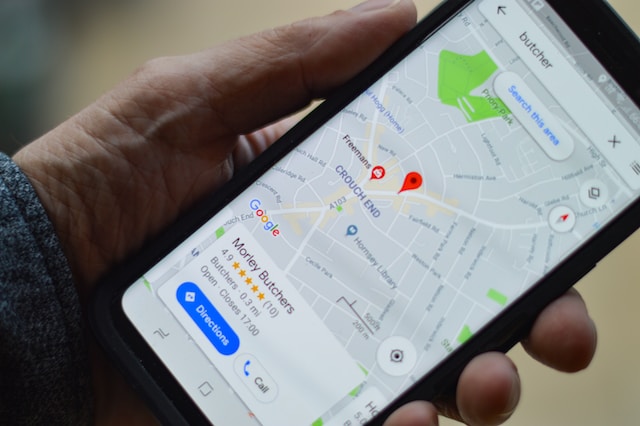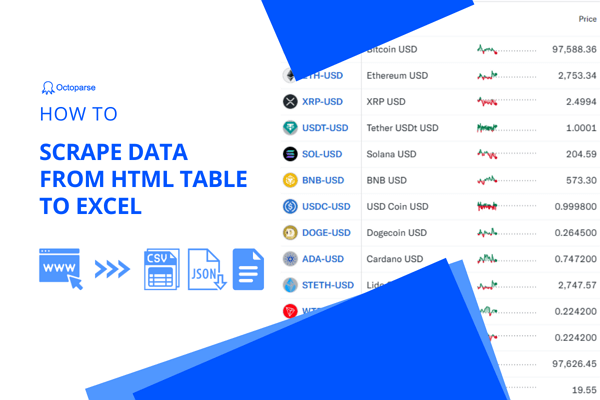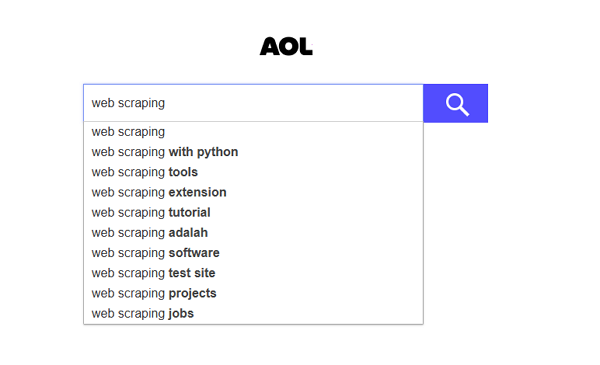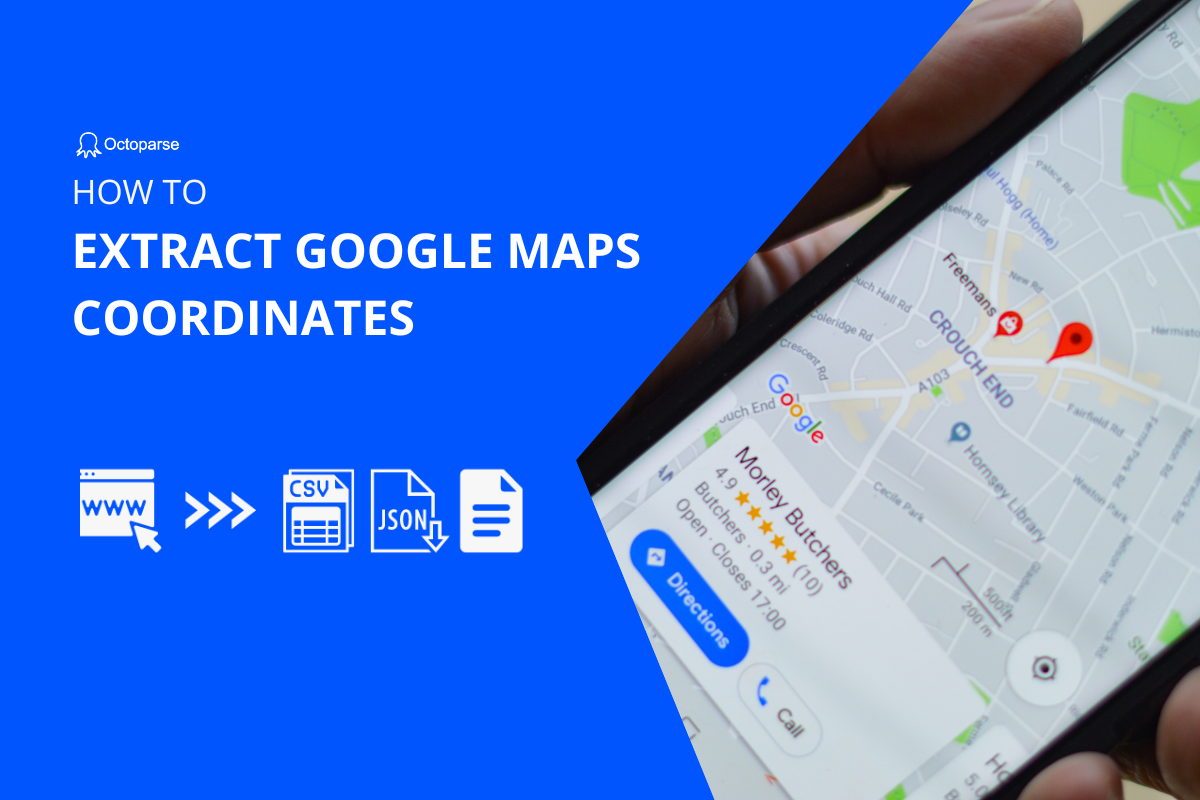Google Maps remains one of the most powerful platforms for local business data and geo-targeted market intelligence. With its extensive listings of businesses, restaurants, schools, and more, it’s a go-to resource for anyone who needs up-to-date local business data or contact details.
If you’ve ever wondered how to extract Google Maps search results, or if there’s a simple way to export Google Maps data to Excel or CSV for bulk analysis, lead generation, or business outreach, you’re in the right place.
This guide explains—step by step—how you can easily perform local business data extraction from Google Maps using proven, user-friendly methods. Let’s jump into the best ways to unlock and use valuable information hidden in Google Maps for your business or project.
2 Proven Methods to Export Google Maps Search Results into Excel
There are various effective ways to export Google Maps search results, depending on your technical skills and project needs.
- For developers, creating a custom crawler using Python or leveraging open-source GitHub projects offers full control over Google Maps data extraction and business listing scraping.
- However, if you prefer a simpler, no-code solution, modern web scraping tools like Octoparse make it easy to automate Google Maps data export and generate structured Excel or CSV files without any programming.
Below, we’ll walk you through two proven methods to extract and export Google Maps business data seamlessly.
Method 1: 3 steps to download Google Maps list as Excel/CSV
A Google Maps list is a feature within Google Maps that allows users to create and organize personalized collections of places or points of interest.
It enables users to compile and save specific locations they find useful, interesting, or relevant for later reference or sharing with others.
Exporting a Google Maps list directly is not provided by Google.
But you can use the steps below to get the Google Maps list data download, or read the easy tutorial about scraping business information from Google Maps.
Step 1: Paste the URL with the keywords you want to search
Search your keyword on Google Maps copy the resulting URL, and then paste it into the main panel of Octoparse.
Click on the Start button to start auto-detecting.
Step 2: Customize the workflow to get the desired data
Create a workflow after the auto-detecting, then add a loop item to the workflow and set loop mode, scroll area, XPath, AJAX timeout, etc.
You can preview the data fields you’ll get and make changes by following the Tips panel it shows if needed.
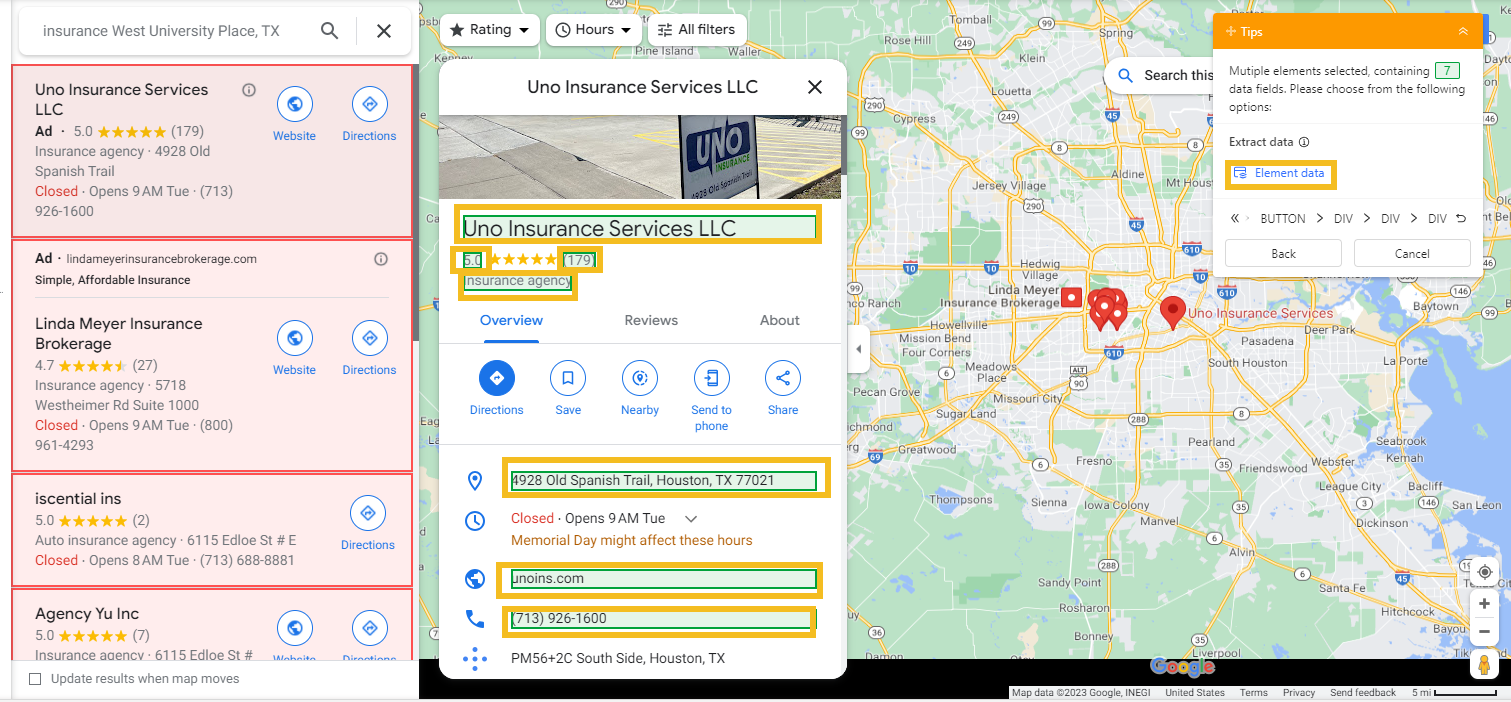
Step 3: Export Google Maps search results to Excel
After all data fields are checked, click on the Run button to run the process.
You can download the scraped data as Excel or any other format once the process is finished.
Another choice is using Google My Maps or Google Takeout if you have created a custom map using Google My Maps.
Go to Google My Maps and open the specific map you want to export.
From the menu, choose “Export to KML/KMZ” or “Export to CSV” to download the data in a compatible format.
Once downloaded, you can import the exported file into Excel.
Method 2: Use Online Scraping Templates — No Coding Required (Highly Recommended 2025)
With Google Maps scrapers, you can export Google Maps search results and get all the business data in an Excel Sheet, a CSV file, or your database.
Octoparse and similar AI-powered scraping tools now offer preset Google Maps scraping templates that leverage auto-detection and pagination handling. These enable:
- Scraping full business leads, ratings, and reviews by keywords or location without programming.
- Continuous scraping with cloud scheduling, IP rotation, and anti-blocking features.
- Exporting clean, structured data directly to Excel, CSV, or databases.
Example:
You can choose to scrape store details by URL, listing pages, or keywords.
https://www.octoparse.com/template/google-maps-scraper-listing-page-by-keyword
You can also only scrape the reviews or the contact details with Octoparse’s Google Maps Contact Scraper templates.
https://www.octoparse.com/template/google-maps-contact-scraper
Just preview the data sample and finish the scraping by entering several keywords (e.g., “Italian restaurants in Austin, TX”) or a Google Maps URL, then run the scraper and extract complete business profiles in minutes..
Video tutorial: Extracting store info from Google Maps
What Data Can You Scrape from Google Maps
Google Maps is one of the most powerful mapping tools on the web to gather information about businesses, schools, restaurants, stores, etc. It is a source of useful information for people who want to get an idea about a place, location, or business.
Google Maps scraping unlocks access to rich datasets including:
- Business name and category
- Full address with latitude and longitude
- Phone numbers and emails (where publicly available)
- Website URLs, social media links
- Ratings, reviews, and review counts
- Business hours and open status
- Zip/postal codes and neighborhood data
- Business images and logos (where accessible)
This Google Maps business data powers powerful market segmentation, lead list building, and detailed local market research—all easily exportable into Excel sheets or CSV.
Benefits of Scraping Google Maps Data
Google Maps data can be extremely valuable to online marketers and digital service providers, who can use them to approach businesses and promote their services. So, It is one of the most effective ways to generate leads and reach out to more customers. It can also help people who are seeking the best places or businesses in their local area.
Here are a range of benefits for businesses looking to streamline their operations, enhance their marketing strategies, and gain a competitive edge in the market.
The Benefits of Scraping Google Maps Data for Businesses
- Accelerate Lead Generation at Scale
Create targeted contact lists with verified business info. Perfect for B2B sales, local advertising, and outreach campaigns. You can read more on our guide if you want to learn how to get qualified leads with web scraping. - Gain Deep Market Insights
Analyze customer reviews, competitor presence, location density, and emerging market trends. - Perform Robust Competitive Analysis
See your competitor business data side by side for benchmarking pricing, service, and market penetration. - Get Custom Data by Industry and Location
Tailor scraping operations to specific cities, product categories, or business sizes for maximum relevance.
Is It Legal to Scrape Google Maps in 2025?
Google Maps discourages web scraping and does not allow scraping its content for use outside the Google Map Service, according to Google Maps terms and conditions.
However, scraping publicly available data from any site including Google Maps is completely legal as it does not violate any privacy rights of Google Maps.
Google Maps also provides an API for users to access the data about Google places details, routes, and maps. With Google Maps API, developers can get data from all the businesses listed in Google Maps using HTTP requests via API.
In general:
- Collecting publicly visible business data without breaching privacy laws is generally lawful.
- Using Google Places API is a compliant alternative for structured data access but may have usage/quotas limits.
- Always respect robots.txt, avoid excessive request rates, and stay within legal boundaries by consulting local laws on data scraping.
- For commercial purposes, prioritize transparent and ethical use of scraped data for marketing or analysis.
Scraping publicly available business data from Google Maps (such as names, addresses, and ratings) is generally legal in many regions, as long as you avoid collecting personal or restricted information and respect Google’s terms of service
Google’s policies and anti-scraping protections have become stricter in 2025, so always use responsible extraction practices, respect rate limits, and comply with local privacy and data laws (such as GDPR and CCPA updates), especially those seeking to achieve bulk Google Maps data export or local business data extraction via scraping should stay informed of evolving regulations around data privacy
For more detailed discussions about the legal landscape of web scraping and recent developments, check our in-depth article on the legacy problem about web scraping.
Troubleshooting Common Google Maps Scraping Issues in 2025
1. Handling Anti-Scraping Mechanisms
Google Maps uses CAPTCHAs, request throttling, and IP detection. Use rotating residential proxies, delay tactics, and browser simulation to avoid blocks.
2. Extracting All Reviews vs Limited Review Samples
Google often limits review data loaded per request. Employ scraping tools that simulate scrolling or use API integrations to capture comprehensive reviews.
3. Scraping Dynamic Content (Infinite Scroll)
Employ scrapers with headless browser support to load all data fully before extraction.
Common Questions About Scraping Google Maps
1. What are the best tools for Google Maps scraping today?
Octoparse, Scrap.io, Bright Data, and Maps Scraper AI are top-rated tools offering automated and scalable Google Maps data extraction with minimal coding.
If you are interested in learning more about free web scraping tools, you read more from our blog “10 FREE Web Scrapers That You Cannot Miss“.
2. How do I avoid IP blocking when scraping Google Maps?
Use rotating residential proxies, randomized delays between requests, and simulate human browsing with a headless browser to evade Google’s anti-scraping measures.
3. Can I combine Google Maps scraping with API data?
Yes, combining scraping with official APIs like Google Places can provide richer, more reliable datasets while maintaining compliance.
4. How can I export scraped Google Maps data to Excel smoothly?
Use scraping tools that support direct Excel/CSV export or integrate with databases and automate export workflows, ensuring data cleanliness and formatting consistency.
Conclusion
Now you have learned two proven methods to easily scrape and export Google Maps search results into Excel or CSV formats. Whether you prefer a no-code approach by using ready-made scraping templates or want to customize your own workflow with Octoparse software, these solutions enable you to automate Google Maps data extraction without complex programming.
We hope this guide empowers you to harness the rich business information available in Google Maps and helps you level up your marketing, sales, or research efforts efficiently and effectively.

